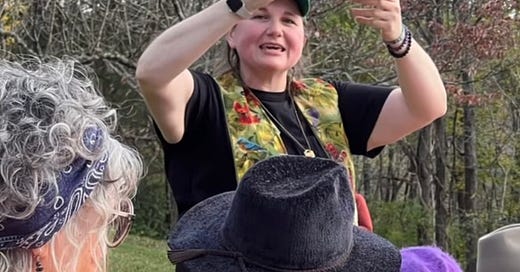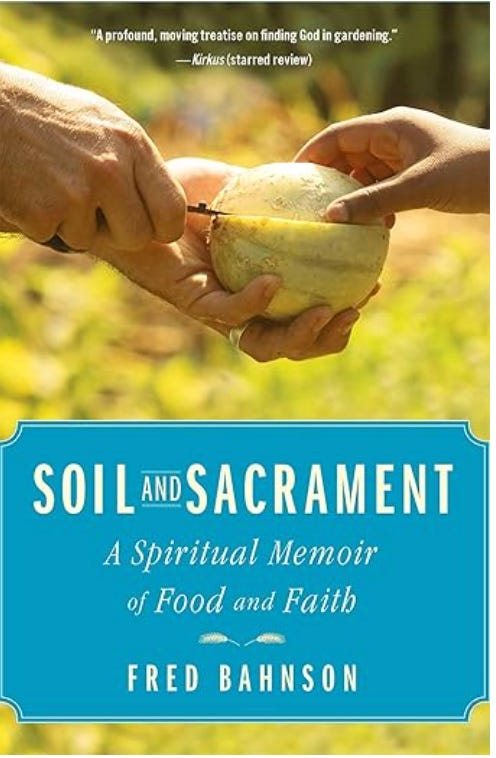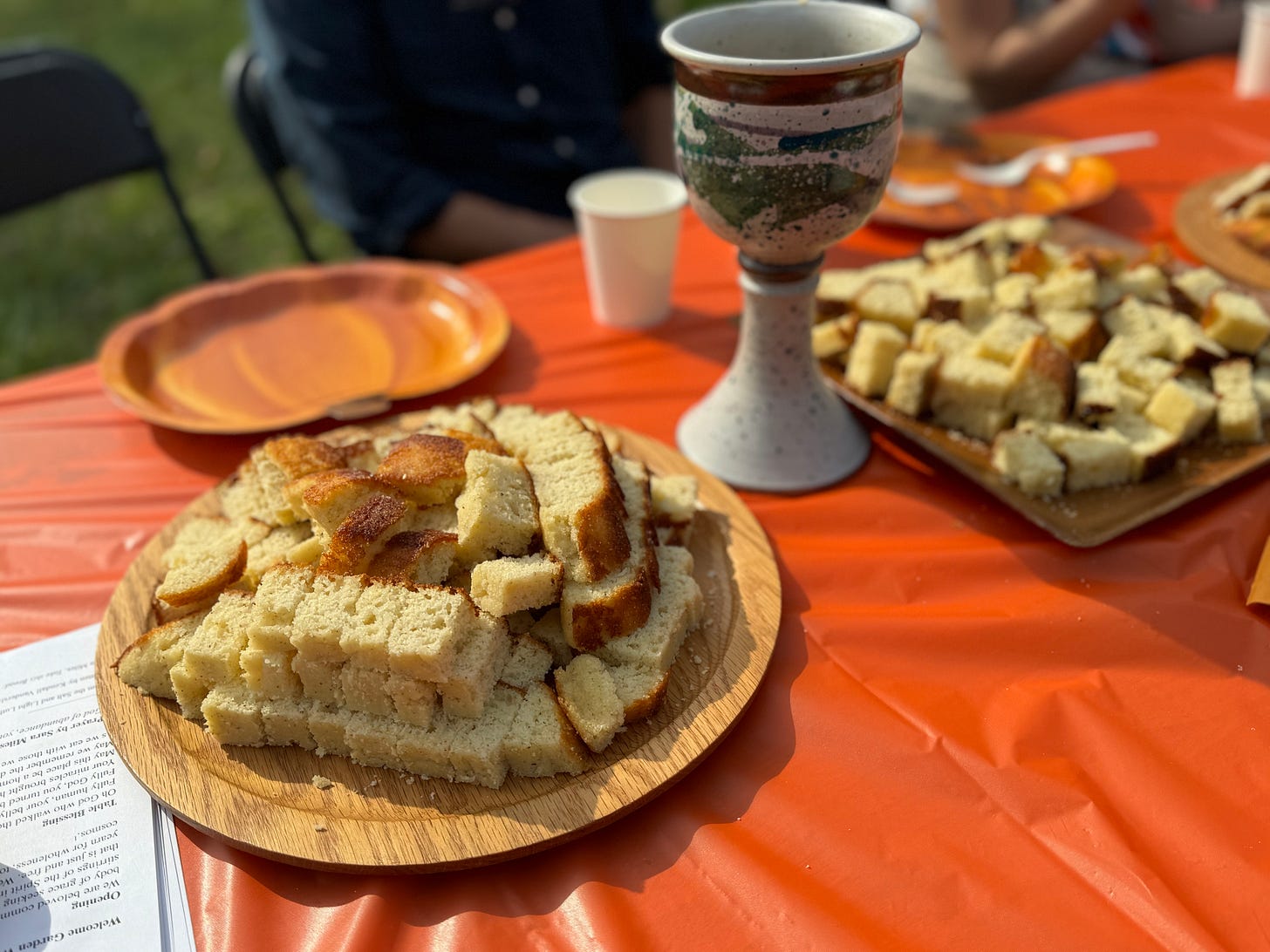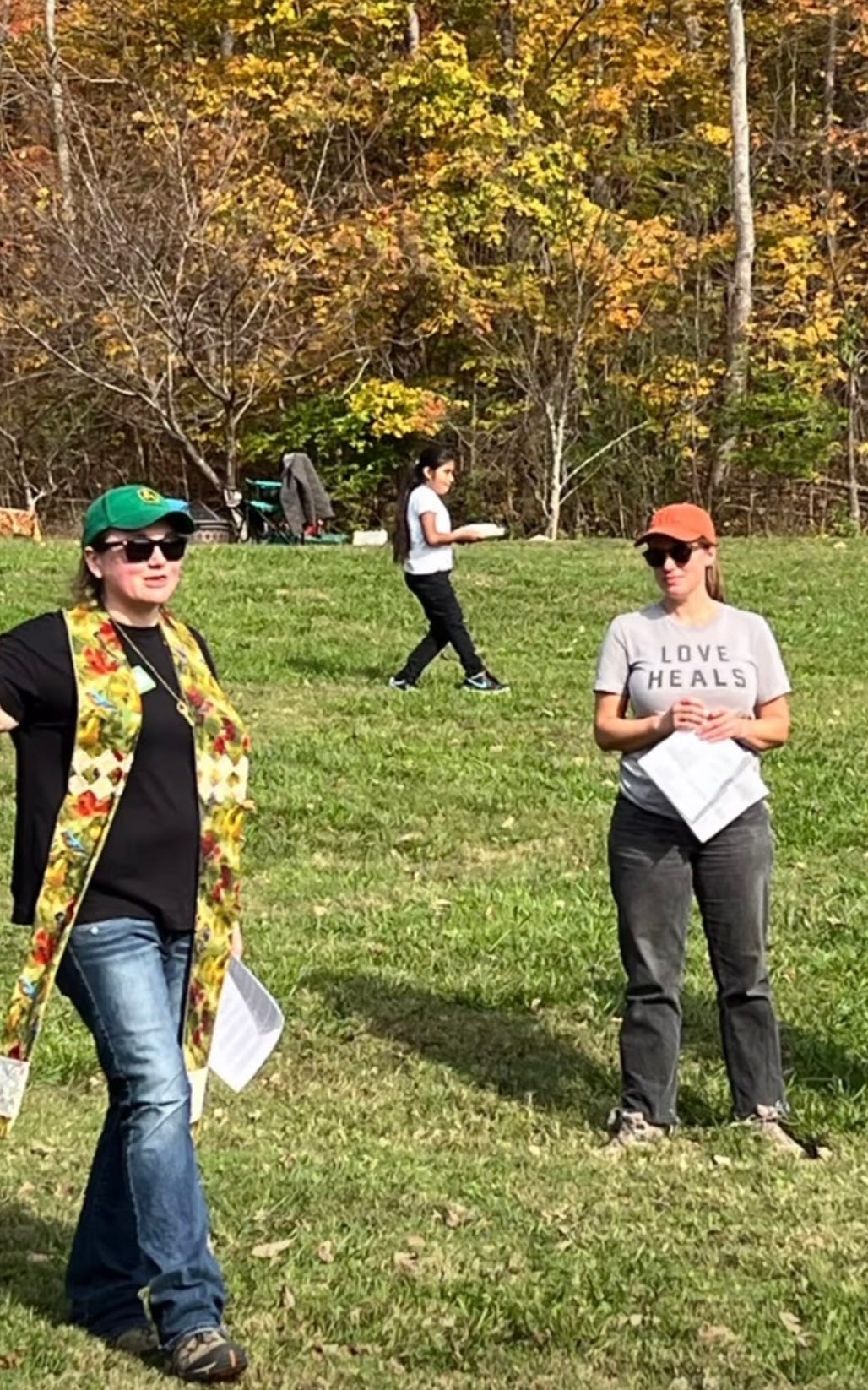T.G.B. Dinner Interview
First up, Rev. Dr. Kate Fields, a leader in community meals, food and faith
Oh hello. I took a longer-than-expected break from writing this newsletter. We’ve been sort of transient the last few months while hurricane repairs continue to happen in St. Pete. I’ve also felt sapped of creative energy —probably because I’ve been doomscrolling too much and feeling paralyzed by the state of the world.
But it’s high time I move out of that now and get busy. I imagine we’ve all heard the sage advice from Mr. Rogers’ mom. When bad things happen in the news, look for the helpers, she’d say. That’s why I’m glad to launch a monthly interview series with people who work through food in ways that can inspire. Food is my favorite way into connection and community care. But we also know food is political, cultural, ancestral, socioeconomic (and more). I hope these posts can be a lens into experience and life and provide ideas for taking action (including pleasure and joy!) in ways suited to our own gifts.
First up, I’m thrilled to talk with Rev. Dr. Kate Fields. She’s a biologist-turned-pastor, and she teaches a Food & Faith course that culminates in an epic community meal. She’s associate chaplain for community life and justice ministry at St. Augustine’s Episcopal Chapel in Nashville. I’m not a member, but I’ve visited St. Augustine’s on several occasions, and I appreciate the church’s incredible work in the community (it’s affiliated through lead priest Becca Stevens with Thistle Farms, a social enterprise for women survivors, as well as The Center for Contemplative Justice). Kate also has been part of a group exploring ways to offer more community meals throughout Nashville, and she’s on the steering committee for No Hate on My Plate, an upcoming initiative from Metro Nashville Human Relations Commission.
“When we’re in community, we’re less isolated,” she said recently at the Phila Awards, which celebrates those who work through food in virtuous ways. “We trust each other more. We start to see each other instead of seeing past each other. We become resilient in our differences.”
I’ve been thinking about community meals (wrote about them here), and when I’m vibrating on my lowest frequency, I worry they can’t possibly be enough. But then I think about how they create a hopeful microcosm of what the world could be and how they help us trust one another, which feels especially important in this time. I heard the writer Yuval Noah Harari say that democracies are based on trust while dictatorships are based on terror convincing us not to believe in institutions—the media, the courts, scientists, etc.—as a ploy to give us a false sense of liberation while only trusting our “leader.” In an article called “You Can’t Post Your Way Out of Fascism,” by Janus Rose (and boy did I need to hear that), the author urges us toward “trusting each other and our own collective sense of what is true and good.” She goes on to say, “We need to collectively decide what kind of world we actually do want and what we’re willing to do to achieve it.”
Kate describes a world I’d like to be in when she talks about dinner—a world where friends and strangers bring tomato pie and collard greens from their gardens and cornbread from their grandmother’s recipe to the table to share and listen and find ways to be there for each other. Yes. More of that.
In future interviews, we’ll hear from community organizers, cooks, farmers and more. Big thanks to Pastor Kate for being our first guest!
JJ: How and when did you take a strong interest in food?
KF: So I’m born and raised in Nashville. Several generations of my family are from Tennessee and my Gran was a Southern Nashvillian cook. She had the accent. She had the cultural recipes. She really instilled in me a love of the land and to cook from it.
I learned her recipes and that started a love of cooking but also a deep appreciation of my culture. For me, cooking is a way to carry down stories and remember my ancestors. Then I went into the field of biology and then theology. The combination of the two fields coalesced in a deep love for ecotheology and creation care, which translated into the local food system, because I think that's just a huge way to care for the earth.
JJ: Is there something that you remember making with your Gran from the beginning or a dish that stands out?
KF: I have since learned many other recipes, but I remember she would pour an entire Coke—she called it ‘co-cola’— on top of a ham. That was her glaze. I remember her making a squash casserole that I make now. Also her cornbread recipe is solid.
JJ: You have a doctorate of Ministry and Land, Food and Faith Formation. Sounds amazing. Can you share about the trajectory from biology to theology?
KF: I was interested in biology and was going to pursue a career in that field. That's because I grew up in a church who didn't affirm women in pastoral ministry. Once I left that church and discovered churches completely celebrating women leading pastorally, that's when I went straight into divinity school.
I looked at theology through a biological lens…I sort of got to see how theology can be very harmful to the earth. I say this within the Christian context. If you believe that we're just sort of passing through, and that this earth will be made new one day and all of that, then it's a lot easier to extract what you need and exploit resources, unfortunately.
I started looking at theologies which reject that sense and understand the earth and the land to be sacred and when we harm creation we in essence harm our creator who created it. That was the journey, and because I had a love of food in my own life that sort of ecotheology slant, or ecofeminist theology is another branch of it, it led me more into food. I went to Vanderbilt Divinity but Wake Forest Divinity had a really cool food and faith program, and I got a fellowship there. I got to study under Fred Bahnson, who is just a really wonderful food and faith writer.
That experience sealed it for me. We come around a table every week in my church and eat bread that was grown by someone, processed and baked, and so too with the wine. It’s central to our faith, but also the table is such a wonderful way to unify and get to know each other. We eat all the time in faith communities, and I care about us becoming more invested in the local food system and using our resources, which are vast. It's not just money, but it's our buildings. It’s the land that we occupy. It's the parking lots. Churches own a lot of land and have industrial kitchens and sometimes walk-in freezers and refrigerators. We could have a huge impact on the local food system if that's what we were focused on.
JJ: How does food highlight some of the pressing issues of our day? Also how can food help solve some of the issues we face today?
KF: I think food shows us exactly what's happening, because we all have to eat. When we look at areas of Nashville that do not have access to fresh food, you start to see there’s a systemic reason that is the case. Food can show the worst of us and the things we can do to each other. For instance, one of the recent executive orders, which I think has been delayed, was going to affect free lunches in schools and SNAP benefits. Do you want to be the one to not give a lunch to a hungry child? It really does show the worst of us. It's such a basic need, and when that's not available to babies, it's pretty indicative of evil.
I think it can also show the very best of us. The table is a place where we actually get to know each other and not continue to believe fantasies about each other based on whatever category you would like to place on that—different religion, different race, a different gender identity, different income level, different age.
I really do believe when we eat together, it provides an entry way into conversation. I can talk about my Gran’s recipes…I can talk about cornbread. I can talk about these memories I have of growing up. It’s an invitation into relationship about who I am and where I come from and for me to get to know someone else too.
Another part I love about food is it involves so many other folks. I feel connected to the farmer here in Tennessee who grew the summer tomato. I feel the love of that farmer and the land. Food reminds me that we're so connected to other folks and the land. We’re not isolated when we eat.
JJ: How has food shown up in your work in powerful ways?
KF: The 100-Mile dinner happens at the end of the Food and Faith class. I ask folks to bring a dish composed of local ingredients, 100 miles or less from where they live. The most recent one happened here at St. Augustine’s at the Welcome Garden, which is our church farm. I prepare for maybe 50 or 60 folks. We had 175 people show up that day, and we sat at the same long, beautiful row of tables that we’d rented on the flat part of a hill. A lot of the church members at St. Augustine’s buy into a CSA from the Welcome Garden, so they brought dishes from the bounty of the land. I do a Eucharist liturgy during the dinner, so I made cornbread, my Gran’s recipe, and brought local cider from an apple orchard not too far away…How often do you get to do that with that many people? Seeing what is possible with community and food.
JJ: Wow. I wish I’d been there. A potluck is such a beautiful thing. The choice that goes into it and thinking about what you’re going to offer. This is a class you teach regularly?
KF: Yes. Thank you. It's essentially an experiential class where I teach about the food system—not just supporting farmers and eating locally, but also food sovereignty and food insecurity and a myriad of things involving the food system. I love taking groups to Bells Bend Farms, a great group of growers also advocating to keep the area undeveloped. We’ve gone to The Nashville Food Project’s Growing Together Farm [a market garden on a church’s property for farmers who came to the United States as refugees from Bhutan and Burma]. What an incredible place to be able to show what a church can do with a little piece of land. Brooklyn Heights Community Garden is another place we’ve gone and out to the the Mill Ridge Farm…The 100-Mile dinner is the gathering at the end that hopefully coalesces what we've learned into a meal around the table.
JJ: If you want to show love or comfort to someone, is there a particular go-to dish you like to share?
KF: I love making pies. There's nothing better than a blackberry pie in the height of summer. I also like making a loaf of sourdough bread. I have a really old world starter, and I love the time it takes to make bread. I think you can infuse so much love in the kneading.
JJ: Is there a time you remember someone giving you something to eat that stuck in your memory as especially caring?
KF: I'll tell you the first thing that came to my mind. I spent three years pastoring a church in Milwaukee. And I really love the culture up there. But I missed the South in a big way and my best friend, who was a Lutheran pastor and was living in Milwaukee as well— decided to make me a Southern meal for my Christmas gift. She’s from St. Louis, so she had a good idea about Southern food. She fried chicken. She made an incredible potato dish like when you come to the church potluck and there's potatoes au gratin, a sort of casserole? It was that vibe.
I think she made this gorgeous chocolate cake. She might have had black-eyed peas too, it's been a lot of years ago. But that meal that I got to eat in the middle of the winter in Milwaukee, which is long and cold and awful, that’s what love felt like—that fried chicken.
JJ: What could we always find in your pantry or fridge?
KF: Well, butter for sure. Also, fresh food. Fruits and veggies are always in my fridge. Right now, it's sweet potatoes. But in the middle of summer, it's all sorts of peppers and tomatoes. You know, summer stuff.
JJ: Your dream dinner party — who would be there? What would you serve? What does it look like?
KF: We're eating in at the height of summer produce in Tennessee. So it’s peppers. It's salads, it's bean dishes and squash. Tomato pie. Cornbread. I'm really into barbecue, being from Nashville…pie for dessert. The folks I love would be there. Becca Stevens, I think the world of her. She also provides a good amount of sassiness. My family. My partner Dillon. It'd be neat to have my Nanna, she’s gone, and my Gran, she's gone. But what a joy it would be to have them with us. I'm really into live music, and I met Amy Grant recently, so it'd be cool to have Amy at the dinner. Or Dolly! Dolly Parton. I think she’s such a good human, and I'm so proud that she's a Tennessean. So it’d be fun to eat with her.
Recipes:
Kate has me craving cornbread, so I’m sharing my family’s recipe for it below. And for an especially comforting main meal to go with it, I’d recommend Red Beans and Rice. I’d somehow never made the dish until a few weeks ago when I heard the news that Pableaux Johnson had died. For years, Pableaux invited people to his home in New Orleans to sit around his grandmother’s kitchen table for Red Beans and Rice. He also took the dinners to restaurants around the country with his Red Beans Roadshow. He worked as a photographer and writer, which Kim Severson of The New York Times shares beautifully in his obituary. Lolis Eric Elie also wrote a lovely remembrance for The Lens.
I hadn’t seen Pableaux in a while. But I was heartened by the outpouring of love for him across the Southern food community. He knew how to put true, rooted and real hospitality into practice. He made people feel part of something special. And I believe he’s doing it still as we remember him and find our own ways to carry his legacy forward in community care.
Pableaux’s recipe for Red Beans and Rice is linked here.
My Grandfather JJ’s Cornbread
1 cup self-rising flour
1 cup self-rising cornmeal
Pinch of baking soda
Pinch of baking powder
1/4 teaspoon salt
1 large egg, beaten
1 1/2 cups buttermilk
1/4 cup bacon drippings
Preheat oven to 450 degrees.
In a medium bowl, combine the flour, cornmeal, baking soda, baking powder, and salt. Form an indentation in the middle of the flour mixture and pour in first the egg and then the buttermilk. Stir to combine. The mixture should be smooth and soupy.
Pour the bacon drippings in a cast-iron skillet and place it over medium heat on the stovetop until the drippings are shimmering. Pour two-thirds of the hot grease into the cornbread mixture and quickly combine. Add the cornmeal mixture to the hot skillet and place it in the oven. Reduce the temp to 425 degrees and bake for 20-25 minutes. The edges should be caramel-colored and the top golden brown. Cool the cornbread for 5 to 10 minutes before turning it out of the skillet onto a place. Slice and serve warm.
Recommendations:
The Serviceberry: Abundance and Reciprocity in the Natural World by Robin Wall Kimmerer: “The serviceberries show us another model, one based upon reciprocity rather than accumulation, where wealth and security come from the quality of our relationships, not from the illusion of self-sufficiency…Hoarding won’t save us….All flourishing is mutual.”
The Life Impossible by Matt Haig:“In every raindrop and scattered participle of light, life sings and blazes even when we are numb to it. When we hide from it. When it is too loud and painful to experience. When we aren’t equipped to feel it. It is there. Waiting to be cherished and protected. Ready to give us at least one more blast of beauty before the night.”
Zero at the Bone: Fifty Entries Against Despair by Christian Wiman: “The only true antidote to the plague of modern despair is an absolute — and perhaps even annihilating — awe.”
“True compassion is knowing we are not separate. Their suffering is our suffering.” -Andy Puddicombe, Headspace
“If we can rebuild community, then whatever threats may come—whether it’s a future pandemic or a worsening climate crisis—I believe that we can come together and deal with it. There are few things we can’t do together; there are many things that we fail to do when we’re alone.” -Former Surgeon General Dr. Vivek Murthy on the Soul Boom podcast









So inspiring and grounding! I get so bogged down in trying to think of “big” acts of resistance, and this reminds me to cherish and invest in what actually builds us up and makes us strong- relationships! Thank you for committing to this labor of love and for building this community around your writing.
This interview makes my heart warm.